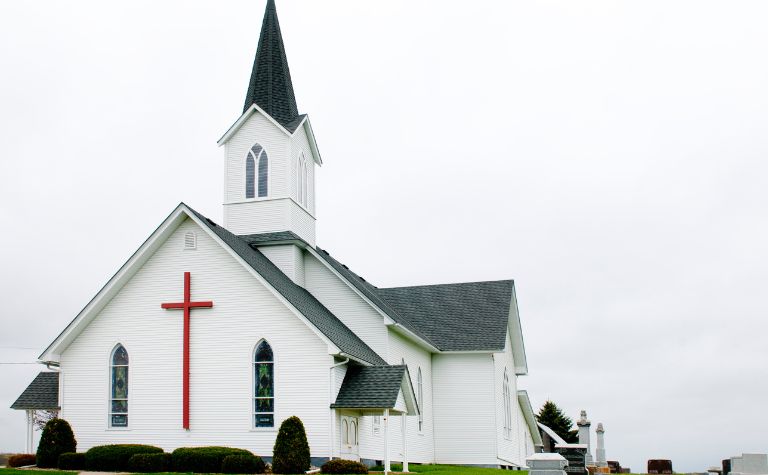The terms “Protestant” and “Puritan” are both associated with Christianity, but many people are not sure what the differences are between them. The terms often describe people, belief systems, and more. So how do “Protestant” and “Puritan” compare?
The word “Protestant” describes the 500-year-old movement that challenged the Catholic church’s teaching of certain doctrines and practices. “Puritan” describes a 16th and 17th-century movement within Protestantism that started in England and branched into America that followed the teachings of John Calvin.
When did Protestantism and Puritanism start? Who are their early influencers? Do Protestants and Puritans believe the same things about God, Christ, Scripture, salvation, and the Holy Spirit? Keep reading to learn more.

Protestant and Puritan: Similarities and Differences
| Protestant | Puritan | |
|---|---|---|
| Origin | 16th-century Europe, especially Germany, under the reforms of Martin Luther (1483-1546). | The 16th-century Protestant reform movements in England. |
| Meaning of the name | The word “Protestant” comes from the Latin word protestari, meaning “to bear witness.” | The name comes from the effort of members to “purify” the Church of England. |
| Early influencer | Martin Luther, John Calvin of France (1509-1564), and Ulrich Zwingli of Switzerland (1484-1531) | William Perkins (1558-1602), William Ames (1576-1633), John Owen (1616-1683), Jonathan Edwards (1703-1758) |
| Significant writing outside the Bible | The Apostles Creed, the Nicene Creed; the writings and sermons of Martin Luther, especially the 95 Theses, Calvin’s The Institutes of the Christians Religion; many others | The works of John Calvin, any of the works of the early influencers mentioned above, The Pilgrim’s Progress by John Bunyan, Paradise Lost by John Milton* |
| Denominations | The largest Protestant denominations today are the Southern Baptist Convention, the United Methodist Church, the Evangelical Lutheran Church of America, and the Assemblies of God. | Puritanism influenced and was influenced by the Presbyterian tradition. |
| Worldview | Protestants may be liberal or conservative theologically or socially. | Conservative in all ways: the Puritan way of life is comprised of discipline, honesty, humility, and devotion. |
Christians from a variety of traditions still read and love the writings of Puritan authors, which are known for their authenticity, passion, and commitment to the details of Scripture. (Also, see Protestant vs. Reformed: What’s the Difference?)
The Puritans, however, did not just write some of the most beloved works in Christian history but had a strong reputation for living out their faith, often with great self-sacrifice. Even for non-Calvinist and non-Reformed believers today, Puritan literature touches the heart.
A.W. Tozer wrote, “To enjoy a great religious book requires a degree of consecration to God and detachment from the world that few modern Christians have. The early Christian Fathers, the Mystics, the Puritans, are not hard to understand, but they inhabit the highlands where the air is crisp and rarefied, and none but the God-enamored can come.”

Protestant and Puritan Beliefs Compared
Historically, Puritanism is a child of the English Reformation. The key tenets of their beliefs included:
- God saves individuals by grace through faith in Christ alone.
- The Bible is the authoritative final word for Christians in relation to belief, behavior, church, work, society, and more.
- Scripture governs all the affairs of the church, not tradition.
- Society is a unified whole: the movement wanted to make all of England Puritan (Also, see Protestant vs. Anglican: What’s the Difference?)
| Protestant | Puritan | |
|---|---|---|
| Scripture | One of the hallmarks of the Protestant tradition is the authority of Scripture over and above church tradition. Protestants historically believe in the inspiration and authority of Scripture. | Puritans believe in the authority of the Bible. Some Puritans believed that Christians should only do what the Bible says. Others held that Christians are only prohibited from doing what the Bible forbids. |
| God | Protestants believe in the Trinity, one God who exists in three persons. The Father, Son, and Holy Spirit are each fully divine. | Puritans, like other Protestants, are Trinitarian. |
| Christ | Jesus is the second person of the Trinity. He is God in human flesh. He is 100% God and 100% man. Jesus was born of a virgin, lived a sinless life, died as an atonement for sin, and was physically resurrection on the third day. | Puritans agree with the historical convictions of Protestantism about the deity, nature, incarnation, atonement, and resurrection of Christ. |
| Salvation | Protestants believe that salvation is by grace through faith in Christ alone. Protestants can be Arminian, Calvinist, Baptist, or something else. | A core conviction of the Puritans is that God alone saves sinners. Faith is a gift from God, which is a point of emphasis in their sermons and writings. |
| Baptism | Generally, Protestants believe baptism identifies a person with the death and resurrection of Christ (Rom. 6:3-5) and obedience to Christ. It also signifies their inclusion into the church community (Acts 2:38-47). Protestants do not agree about who (children or adults) should be baptized and how (sprinkling or immersion). | Puritans baptized infants in the framework of Covenant Theology according to the Reformed tradition. |
| Communion | Generally, Protestants believe the Lord’s Supper is a continual practice that Christ started before his death and resurrection. Protestants don’t agree about the nature of the bread and cup. | With regard to the nature of the bread and cup, Puritans believe in the Real Spiritual Presence of Christ, in contrast to transubstantiation or the memorial view. |
| Holy Spirit | The Holy Spirit is the third person of the Trinity. He is fully divine. The Spirit applies the salvation that the Father planned and that the Son earned for sinners. He bestows spiritual gifts on believers that they are to use for the edification of the Church. | Puritans agree with the historical convictions of Protestantism about the nature, deity, and work of the Holy Spirit. |
| Church | A key tenet of Protestantism is that the Church is comprised of people who Christ has saved from sin. | Puritans agreed that Scripture should govern all the affairs of churches, including their government. They did not agree on what form it should take. Episcopal, presbyterian, and congregational government models could be found among the Puritans. |
| The Return of Christ | Protestants believe in the Second Coming of Christ, which is a core belief in the tradition. | The Puritans, like other Protestants, believe in the Second Coming of Christ. |
| Family Life | There are a variety of views about family life in the Protestant tradition. | The nature and organization of the family were of utmost importance to the Puritans. Marriage was theologically, socially, and practically of great significance in the Puritan worldview. |

3 Quotes About the Puritans
J.I. Packer: “The Puritans…were great souls serving a great God. In them, clear-headed passion and warm-hearted compassion combined. Visionary and practical, idealistic and realistic too, goal-oriented and methodical, they were great believers, great hopers, great doers, and great sufferers.”
Charles Spurgeon: “The Christian family was the bulwark of godliness in the days of the Puritans; but in these evil times hundreds of families of so-called Christians have no family worship, no restraint upon growing sons, and no wholesome instruction or discipline.”
He continues, “See how the families of many professors are as dressy, as godless as the children of the non-religious! How can we hope to see the Kingdom of our Lord advance when His own disciples do not teach His gospel to their own sons and daughters?”
Leland Ryken: “The Puritans declared the sanctity of all honorable work. In so doing, they rejected a centuries-old division of callings into “sacred” and “secular”… This Puritan rejection of the dichotomy between sacred and secular work has far-reaching implications.”
He continues, “It judges every honorable job to be of intrinsic value, and integrates every vocation with a Christian’s spiritual life. It makes every job consequential by regarding it as the arena for glorifying and obeying God and for expressing love (through service) to a neighbor.”
References:
[1] Source
[2] Source
[3] Source
Related Questions
Catholic vs. Protestant vs. Orthodox: What's the Difference?
Roman Catholicism, Protestant Christianity, and the Eastern Orthodox Church are the three historical branches of the Christian religion. Each tradition traces its doctrines and practices to the New...
Protestantism and Anglicanism are branches of the Christian faith that have roots in Europe. Protestantism and Anglicanism have similarities and differences with each other as well as other...
